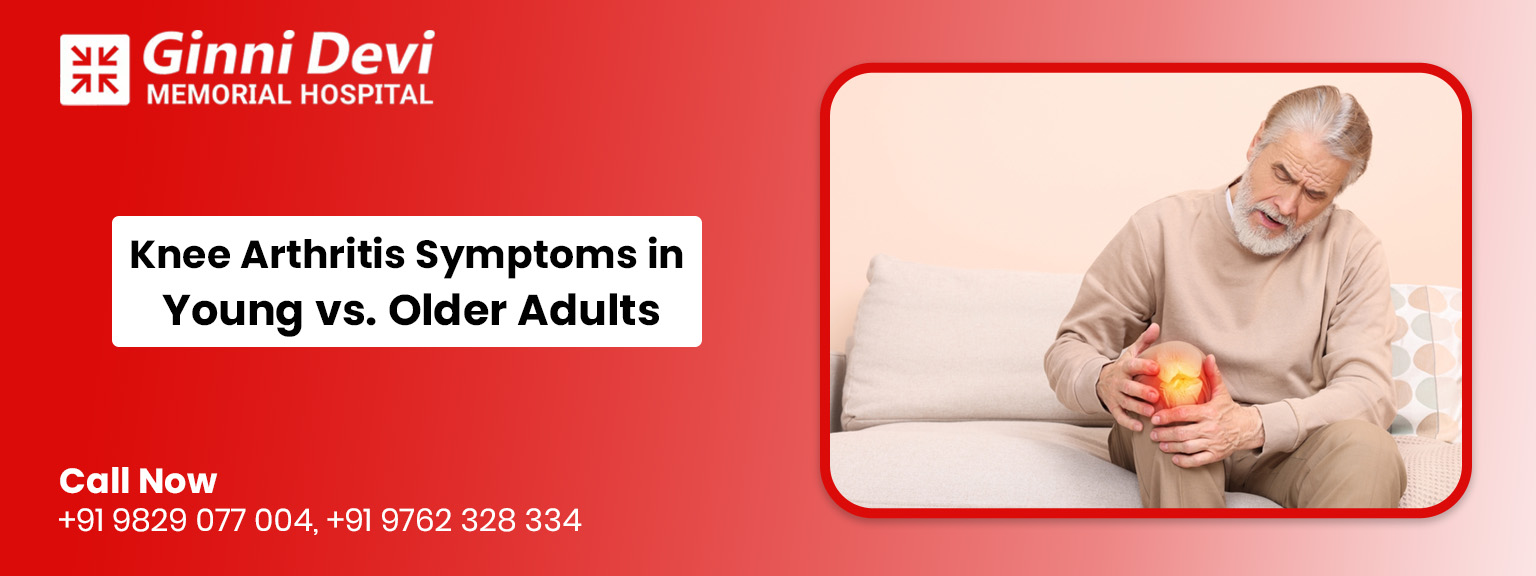Arthritis is not an old “senior citizen” problem anymore. Today, young adults in their 20s and 30s are limping into clinics complaining of tired, achy knees and persistent discomfort. The old person’s ailment has stealthily reached the younger ones, too.
At Ginni Devi Memorial Hospital, Jaipur’s preferred joint-care Hospital, we’re witnessing an emerging trend that knee arthritis symptoms in young adults are increasing quickly. But here’s the rub: The symptoms, triggers, and disease progression in those with early onset often differ from what occurs in older adults.
This blog examines the difference between knee arthritis in younger and older individuals. Recognising the warning signs early can make a world of difference in preserving the health of your knees.
What is knee arthritis?
Knee arthritis is the inflammation of one or more joints in the knee, most commonly caused by osteoarthritis—a condition where the protective cartilage that cushions the bones wears down over time. While many associate arthritis with old age, it’s increasingly affecting younger individuals due to lifestyle habits, injuries, and genetic factors. Other common types include rheumatoid arthritis, post-traumatic arthritis, and autoimmune-related conditions. At Ginni Devi Hospital, a leading Knee Arthroscopy Hospital in Jaipur, our orthopaedic experts emphasize that early identification of arthritis symptoms in young people is crucial for effective treatment and long-term joint health. Early-stage intervention can help prevent the condition from progressing and reduce the need for surgical correction in the future.
Knee Arthritis Symptoms in Young
If you’re under the impression that arthritis strikes only at age 60 and older, here’s your wake-up call. Here are some of the most frequent knee arthritis symptoms in young people:
- Pain after walking, running, or exercising
- Rigidity after standing or sitting for a while
- Clicking or popping in the knee when it is bent
- Temporary swelling/dip post-use
- Pain when climbing stairs or squatting
- Weakness or knee instability.
Symptoms of Arthritis in the Knee in the Elderly
In older people, these symptoms of knee arthritis occur more commonly. Here’s what those individuals tend to say:
- Persistent aching pain even during rest or sleeping
- Sensation of the knee being warm to the touch
- Feeling of grinding or bones rubbing together
- Stiffness that lasts longer in the morning
- Mobility issues (as in, difficulty walking, standing for long periods, or sitting for too long).
What Can You Do? Early Action = Healthy Knees:
Even if you are 75 instead of 25, arthritis doesn’t have to doom you to a life of diminished freedom. Here’s what both younger and older patients should pay attention to:
- If you have knee arthritis symptoms as a young adult, then here are some tips:
- Don’t ignore pain; get it checked!
- Apply the ice packs to cool inflammation after your workout.
- Opt for low-impact exercise (cycling, swimming).
- Maintain a healthy weight.
- Avail a customised plan from the Best Orthopedic hospital in Jaipur.
For Older Adults:
- Gentle physiotherapy & daily stretching
- An anti-inflammatory diet (more greens, less sugar)
- Use knee support like braces.
- Pain management with medication, but before seeking advice from the doctor
- If the pain is consistent or doesn’t improve with any other treatment, then go for knee surgery.
Where to Go for Help?
Ginni Devi Memorial Hospital, Jaipur, is the place to be when it comes to all things knee, for an up-and-coming athlete or a senior seeking relief. The hospital has the best knee replacement surgeon in Jaipur, and along with this:
- Advanced diagnostics
- Customised treatment plans
- Non-surgical treatments for early arthritis
- World-class surgical care as necessary
- Physiotherapy treatment for all ages, including those with knee arthritis symptoms in youth.



